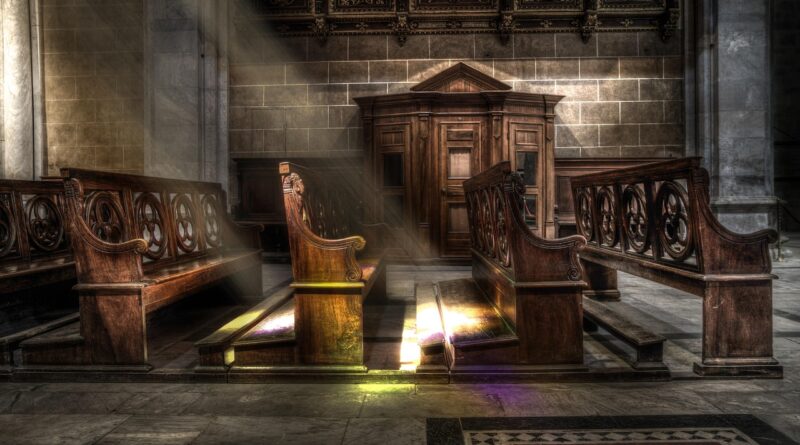The Perfect Church
The perfect church; does it exist? Can a church be without flaws?
As the saying goes, “Beauty is in the eye of the beholder.” Is the perfect church in the eye of the attendee?
Having spoken to hundreds of people who have left a church for one reason or another, many different reasons emerge. The church was not friendly, our kids were the only children/teens there, the preacher was boring, the congregation didn’t have a Christ-like spirit, the sermons were too long, they didn’t teach the truth, more reasons can be added to this list, but that is enough for now.
The problem with multiple people making a judgment on whether something is good or not is that widely different opinions often emerge. In the short list above, some people believe that teaching is paramount. In contrast, others felt that friendliness was the deciding factor. Don’t get me wrong; I am not saying that churches shouldn’t be friendly or preach the truth. I am only trying to point out that when people look at a church, they tend to prioritize specific observations over others, and that priority differs from person to person.
The New Testament is full of writings to churches or the church in general. The four gospels give the life story of Jesus. The entire book of Acts is about the beginning days of the church, Paul’s founding of specific churches, and the growing pains associated with the start of Christendom. The following nine books, from Romans to 2 Thessalonians, are written to particular churches. The following three books are written to ministers in the church. Of the following nine books, two are addressed to specific individuals, while the remaining seven are written to Christians in general. The Bible’s final book, Revelation, is written to seven churches. Given the significant focus of the New Testament on the church, wouldn’t it be reasonable to conclude that the church is something of great importance to God?
People will claim to be Christian, start attending church, and then something happens. Because of what happens, they stop going to church, not just the church they were attending, but they refuse to go to any church. This reaction doesn’t make sense. Christians are called to strive for a Christ-like heart. Obviously, Christ has a heart for the church, or He would not have emphasized it so much in the New Testament. There is also the fact that He commands us to attend (Hebrews 10:25). Consider this: you go out to eat. The waitress is rude; there is a mistake with everyone’s order, the food is undercooked, and the restrooms are filthy. No one would blame you for never going back to that restaurant, but isn’t it a bit overreacting if you never go out to any restaurant ever again?
Can a nonchrist-like church change? Yes, most definitely, a church of hypocrites can change. In the book of First Corinthians, Paul spends fourteen of sixteen chapters lambasting them over the problems in the church. There was pride; the church was divided into cliques. One man was having an affair with his stepmother, and the church was tolerant of the affair because they believed it was a wonderful expression of love. There was more that Paul brought up, but I hope these examples are sufficient to demonstrate that the church of Corinth was a mess.
A few years later, Paul wrote Second Corinthians, praising God for how the church at Corinth had fixed all the problems. The lesson here is that God can turn around the worst of individuals and the worst of churches if they let Him.
As mentioned earlier, the book of Revelation is written to seven churches. God gives us the characteristics of the seven churches. A report card, if you will.
In four of the seven churches, Jesus mentions both the good and the bad aspects of each one. All four had their specific strengths and weaknesses.
One of the seven churches received an F on their report card. Jesus had nothing good to say about the “church of the Laodiceans.”
The good news is that, out of the seven churches of Revelation, there were two that God said nothing bad about at all. Since God had nothing bad to say about them, are these two churches perfect churches?
As we examine the two churches, one thing that stands out to me is that life in these two churches was not the same.
Smyrna (Revelation 2:8-11) was commended on their work ethic and spiritual wealth (even though they were materially impoverished). God does warn them that they will suffer. Tribulation was coming, and several of them would be cast into prison. God encourages them to endure through faith the problems ahead and promises a reward to those who persevere to the end.
God commends Philadelphia (Revelation 3:7-13) for their exemplary work ethic, their unwavering adherence to God’s Word, their refusal to deny God’s name, and their enduring patience. God does promise to open a door to the church of Philadelphia that no one but God could open or close. God opened that door because the church had “little strength” (v8) and to bring those “of the synagogue of Satan” to salvation (v9).
God does warn the church of Philadelphia to let “no man take thy crown.” God does not express how they could lose their crown, but I’ll go out on a limb and say that the crown is probably lost by losing the characteristics God praises them for.
There is one thing that God told all seven churches, “He that hath an ear, let him hear what the Spirit saith unto the churches” (Revelation 2:7,11,17,29; 3:6,13,22). Telling all the churches this, regardless of their spiritual condition, tells us that listening to and heeding the Word of God is essential for the spiritual well-being of churches and, therefore, individual Christians.
One last thought. Many proclaiming Christians would run to Philadelphia. God has opened a door; people are being saved, lives are being changed, the church is growing, and it is dynamic and exciting.
Then how many Christians would venture to be part of Smyrna? God had nothing bad to say about that church, but how many would want to serve God in an atmosphere of persecution and possible imprisonment?
When looking for a church or examining the church we attend, our questions should be: God, what do you want? Where do you want me to serve?

Preacher Tim Johnson is Pastor of Countryside Baptist Church in Parke County, Indiana. His weekly column “Preacher’s Point” may be found at: www.preacherspoint.wordpress.com

